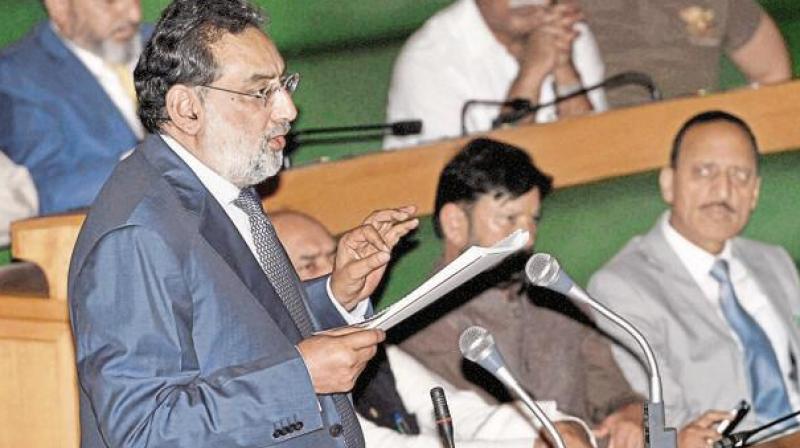Kashmir: Repression is at an all-time high
BJP ministers in Kashmir, backed by the BJP government at the Centre, are defiant.

The sacking of Kashmir’s finance minister Haseeb Drabu by Chief Minister Mehbooba Mufti on March 12 will give a severe jolt to the PDP’s coalition with the BJP. He was its architect, in partnership with BJP general-secretary Ram Madhav (an RSS official seconded to the BJP). Madhav has declared that there is no Kashmir problem. Drabu said something very similar on March 9. “Don’t see J&K as a conflict state and a political issue,” he posited. “It is not a political issue as far as I can see. They have been barking up the wrong tree for the last 50 or 70 years by talking about the politics of it, that the political situation has never improved. We seriously need to look at it in terms of how it is a society that is in search of itself.”
He spoke thus in New Delhi, where he was expected to project Kashmir’s viewpoint, at an event called “Kashmir: the Way Forward”. Instead, he berated Kashmiris for “barking up the wrong tree” by espousing their political cause. This covers not only the stooges whom New Delhi installed in power in Srinagar since August 8, 1953, when Prime Minister Sheikh Mohammed Abdullah was thrown out in a coup, engineered by the Indian government, but Sheikh sahib also. It confirmed the widely held suspicion that his eyes were set on New Delhi. He is the one who had drafted the PDP’s famous document Jammu & Kashmir: The Self-Rule Framework for Resolution. It envisaged not only drastic constitutional change to ensure “self-rule”, but also an accord between India and Pakistan. Paragraph 51 listed six “methods for consideration”; two were for a plebiscite; one was for elections “held under international supervision”; one more for an election and two others for steps based on these ideas.
Six year later, he drafted with Madhav the PDP-BJP Agenda of the Alliance, which congealed the status quo of a deformed and hollowed out Article 370 (the so-called guarantee of autonomy). Drabu’s boss, PDP supremo Mufti Mohammed Sayeed, desperately sought a return to power; if need be, by selling his people’s rights and his own soul. A former chief of RAW disclosed that he was in parleys with the BJP even during the elections. He justified the pact with the puerile remark that he was joining the North and South Poles. That false partnership has come unstuck. BJP ministers in Kashmir, backed by the BJP government at the Centre, are defiant. So is Jammu. Kashmiris feel deceived. On Mufti’s watch, pellet guns have been used by the Army. On January 17, the body of a small girl from the Muslim Bakarwal nomadic community was found in Kathua in Jammu. She had been abducted, raped and killed. A group called Hindu Ekta Manch called for a probe by the CBI, not the police in Kashmir. The Manch complains of a “demographic invasion”; Jammu’s communal divide has widened. Then, on March 4, two militants and four civilians were killed in Shopian.
Contradicting the Army’s statement, Mufti herself called them “civilians caught in the crossfire” that day. By March 6 she denied this, and the fact that an FIR had been filed against Maj. Aditya Kumar — the day after the Supreme Court had forbidden its filing. The local police are sensitive to the people’s feelings. But it gets scant support from the Chief Minister. The Centre backs the Army. Repression is systematic and at an all-time high. No leader commands the respect that the aged, ailing Syed Ali Shah Geelani does. Yet he is singled out for attack. Under house arrest since October 2010, when Omar Abdullah was chief minister, neither his son nor even the vegetable vendor can enter his house. His wife needs eye surgery, for which he has no means. It is a shame and disgrace. Why are India’s human rights activists and international rights organisations silent?
By arrangement with Dawn

